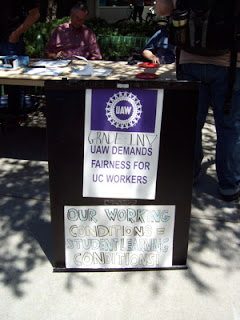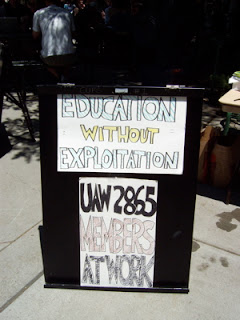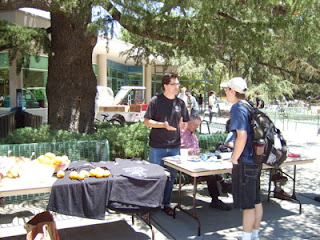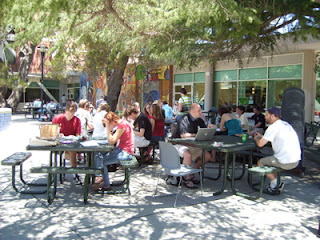From the Academic Student Employee union (UAW #2865) at UC Davis:
As an important step toward winning our bargaining demands for improved workload protections, UAW 2865 members around the state are having a grade-in/tutor-in during finals week. Our action will demonstrate to the University of California just how much work it takes to ensure the students at UC Davis get the quality education they deserve. Come out and show your support for increased workload protections while you get your work done.
WHO: All TAs, Graders, Tutors and Grad Students
WHAT: Grade-in/Tutor-In
WHERE: Memorial Union Patio
WHEN: Tuesday, June 12, 11:30am – 1pm
As contract negotiations have progressed, the administration has stalled having any serious discussion over workload. As enrollment has steadily increased statewide, class and section sizes have ballooned, creating more work for Teaching Assistants, Tutors, and Readers. When we are overworked we cannot provide quality education to our students and we are slower to advance in our academic careers. We are faced with pressure to speed up our work and do more with less. Employees want increased workload protections that would give the union a say over class and section size.
The Union has made several proposals to proactively prevent overworking that have not been addressed by the administration. In addition to negotiating with UC administration over class and section sizes, TAs Tutors, and Readers also want to win the right to arbitrate over workload. With the current contract, academic student employees cannot take workload grievances to arbitration, which means any workload disputes are settled by an internal university board rather than a neutral arbitrator.
We need to show the administration that the issue of workload is important to us and remind them how crucial our work is for the quality of education at the University of California. Bring any exams or papers you need to grade or hold outdoor office hours/tutoring sessions and help send a strong message to the administration that they must address this key issue.
Grading makes finals week a crazy time of year for grad students who tutor or TA undergraduate classes, but most of the time the time that we put into that work is invisible to both the undergraduate students and the univeristy administration. The larger the section and the greater the workload, the harder it gets to do that grading to the best of one’s ability, and everyone on campus ends up losing as a result. As a way of raising the visibility of this critical work, and demonstrating to the administration that we are not just going to be pushovers in the rest of our contract negotiations this summer and into next fall quarter, please show up and get some grading done out on the MU patio. Similar events will be scheduled at the other quarter-based UC campuses, please feel free to post info in the comments.
This looks like a lot of fun, and a creative sort of protest to boot. See you all there!
originally at surf putah
—–
UPDATE The grade-in/tutor-in had a pretty good turnout for a finals week at noon (several TAs were busy proctoring final exams, and couldn’t make it), between 20 and 30 from my count, grading together on tables in the shade. The Enterprise had a reporter and photographer there interviewing some of the workers, and a fair number of curious undergraduates stopped by and wanted to know what was going on. All in all, a good way to get some visibility, and it beat grading in the office!
Here are a couple of pictures of the grade-in:
Sign 1: “Our Working Conditions =Student Learning Conditions”

Sign 2: “Education Without Exploitation”

A Teaching Moment:

ASE Graders At Work:


